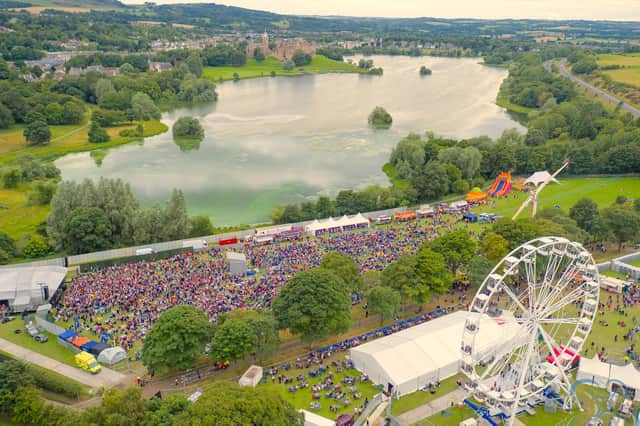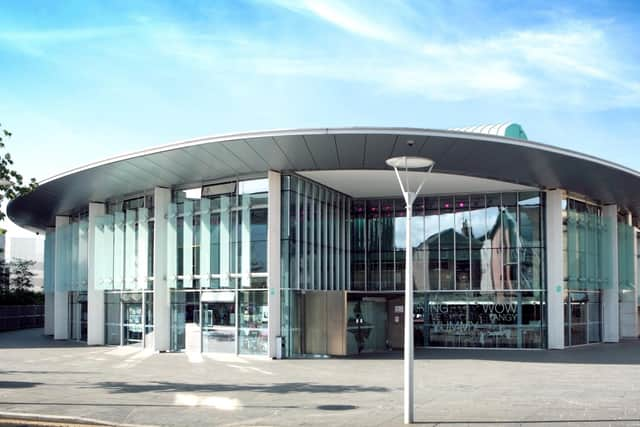Festivals and venues ramp up pressure to ease social distancing restrictions in Scotland


Organisers have warned that Scotland s summer festivals calendar faces being "completely wiped out" unless restrictions are eased in line with the UK Government’s timetable, which envisages the end of restrictions next month.
There are concerns some long-standing events may not return without extra financial support to see them through until next summer.
Advertisement
Hide AdAdvertisement
Hide AdLeading Scottish theatres say the pandemic has left the industry “in crisis, with all income lost and precious little hope on the horizon.”
The operators of the Pavilion Theatre in Glasgow, Perth Concert Hall, the Alhambra Theatre in Dunfermline and the Tivoli Theatre in Aberdeen have warned that Scotland is at risk of being left off UK tour schedules for the rest of the year if the country keeps social distancing rules intact.
Some of Scotland’s leading independent festivals, including Party at the Palace in West Lothian, Knockengorroch in Galloway, Mugstock in Perthshire and Doune the Rabbit Hole in Cardross, today joined forces with the Association of Independent Festivals and the National Outdoor Events Association to condemn new event guidelines, published last week of a planned reopening date of 17 May.
Under Scotland’s current route map, audiences of up to 400 indoors and 2000 outdoors will be allowed by the end of June, but event organisers are being told they must enforce two metre social distancing, even for festivals planned later in the summer.
A joint statement said: “Those conditions would effectively mean the immediate cancellation of most if not all major music festivals in Scotland this year.


"There is a real danger that for a second year running, Scotland’s music festivals will be completely wiped out. Music festivals take months to plan and we cannot wait any longer for support.
"Our industry is already witnessing casualties. While many festival promoters may be able to
Advertisement
Hide AdAdvertisement
Hide Adcarry on for one more year, we are seeing parts of the supply chain disappear.
"Suppliers going into liquidation, freelancers retraining and looking elsewhere for employment. We are genuinely concerned that there may not be the support and supply chain in place to allow festivals to return in 2022.
“We appreciate how incredibly difficult this pandemic has been and the work put in to keeping us safe. We also recognise that many sectors of the economy are asking to be first in the queue.
"We recognise that we will be one of the last sectors to emerge from this, but we won’t be able to do so without further clarity and support.”
Nick Williams, chief executive of Horsecross, which runs Perth Theatre and Perth Concert Hall, said: “
"Curtains are going up in England, but doors to Scotland's important arts venues are firmly shut. That risks irreparably damaging not just the arts sector in Scotland, but the towns, cities and thousands of local businesses that venues help support.
“We have robust Covid procedures in place for the protection of audiences, performers and staff.
Advertisement
Hide AdAdvertisement
Hide Ad“Concert halls are generally well ventilated with good airflow systems, high ceilings and spacious interiors. Audiences sit side by side all facing in the same direction for a limited period and can be asked to wear masks.
"We find ourselves in a situation where customers could be sitting at one metre distance from other households in our café without masks, then have to move to 2.5m distancing with masks as they enter the auditorium.
“As a sector, we feel that our responses and needs are being ignored despite communicating openly and proactively with the Scottish Government to establish reasonable measures to help us operate in these extremely challenging times.”
The Scottish Independent Theatres Association, which represents the Pavilion, the Tivoli and the Alhambra, said there was “a great deal of anxiety” across the industry.
A joint statment on behalf of its members said: “Reopening at anything less than 75 per cent capacity would simply not be viable on our existing operating model. We simply cannot afford to operate on the kind of loss which would inevitably come with enforced two metre social distancing or a capacity cap.
"The differing stances on capacity caps between Scotland and England is in danger of causing havoc with upcoming tours, and could end up causing real problems for Scottish theatres who cannot open to the same capacity as their English counterparts.
"We are seeking urgently clarity from the Scottish Government on whether a second round of funding will be made available to theatres, greater clarity on social distancing guidelines, and an urgent reassessment of the reopening road map.
Advertisement
Hide AdAdvertisement
Hide Ad"Without these, Scotland’s cultural landscape, of which the Scottish Government is rightly proud, may begin to look very bleak indeed.”
First Minister Nicola Sturgeon and culture secretary Fiona Hyslop have both pledged that the current social distancing restrictions and capacity limits will be reviewed if the SNP is returned to power.
Ms Sturgeon said: “Culture is central to who we are as a nation. That’s why the SNP has placed it at the very heart of our plans for recovery from Covid.”
However Gavin Stevenson, vice-chair of the Night-Time Industries Association in Scotland, said: “The Scottish Government has had 15 months to engage meaningfully with the sector during the pandemic.
"If culture was indeed central to who we are, the culture sector, including the majority for the sector which is small, private businesses such as music venues, nightclubs, comedy clubs, and others, should have had substantial and meaningful engagement with the government throughout the pandemic.
"It should have listened to the commercial needs of venues, artists and freelancers and responded accordingly. And they would most certainly now understand the untenable financial position that distancing and other restrictions have forced the sector into.
“Only a firm commitment to imminent indicative dates encompassing the prompt phased withdrawal of all legal restrictions can salvage a future for our sector.”
A message from the Editor:
Thank you for reading this article. We're more reliant on your support than ever as the shift in consumer habits brought about by coronavirus impacts our advertisers.
If you haven't already, please consider supporting our trusted, fact-checked journalism by taking out a digital subscription.
Neil McIntosh
Editor
Comments
Want to join the conversation? Please or to comment on this article.